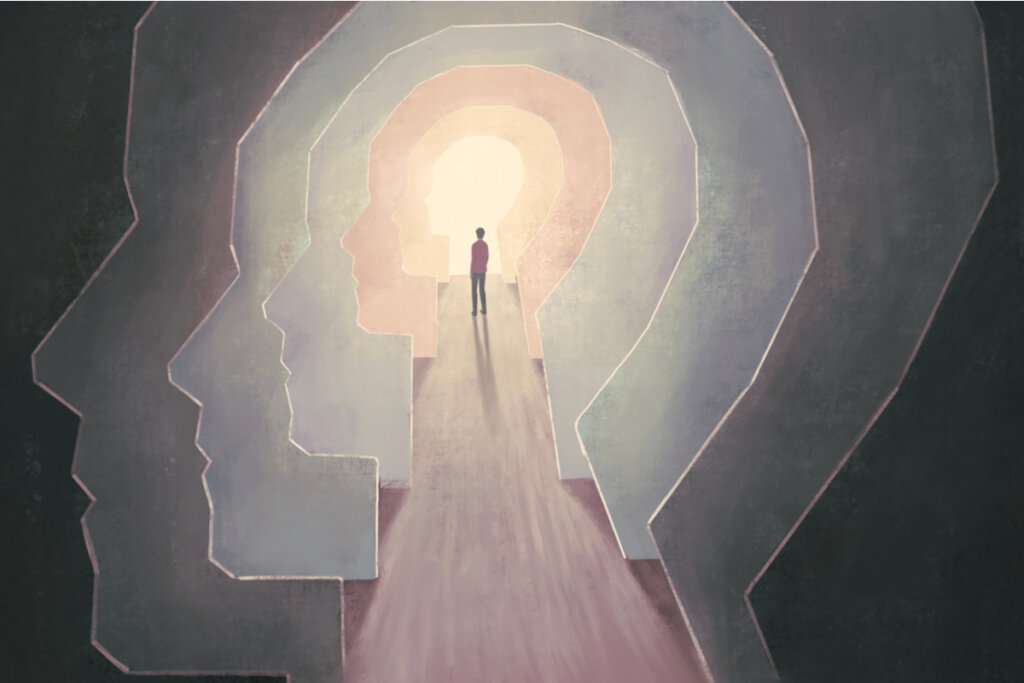How Long Until Psychological Therapy Starts to Work?


Written and verified by the psychologist Valeria Sabater
When people request psychological help, they often ask how long it’ll take for it to start to work. As a rule, the patient will notice changes during the first three sessions. Indeed, at this stage, they usually experience some relief due to feeling understood and forging an alliance with the therapist who’s guiding them on their journey.
However, significant advances depend on the circumstances of each patient. They also depend on the psychologist and the type of methodological strategy they carry out. There are also some mental conditions that require longer treatment time. For example, personality disorders or major depression.
Cognitive behavioral therapies that focus on specific problems are usually the shortest treaments.
Factors that determine how long it takes for psychotherapy to work
Taking the first step and going to therapy is often an exercise in courage. Indeed, the individual may have to overcome many fears simply to reach the waiting room. It’s a process that isn’t easy for everyone because it can be a painful undertaking and/or it also has an economic cost.
This makes some patients want to achieve results as soon as possible. In such cases, it’s useful to know that there are many variables mediating the long-awaited therapeutic advance.
A review conducted by the University of Zürich (Switzerland) claims that improving the precision of estimating the number of sessions a patient might need would represent progress within the mental health field. For example, in the UK, the minimum tends to range from eight to 20 meetings.
However, once again, each patient is different. Consequently, it isn’t always easy to figure out when they might be ready to finish the therapy.

1. What does the American Psychological Association say?
In 2017, the American Psychological Association (APA) published data on the number of sessions needed for a patient to perceive change. They offered the following information:
- If 15 to 20 sessions are undertaken, 50 percent of patients will be able to continue autonomously.
- Due to their susceptibility to relapse, some disorders require a longer therapeutic intervention.
- People with personality disorders require therapeutic care at various stages of their lives.
- There are some psychological therapies that, due to their approach, require fewer sessions and, in certain cases, can be just as effective. For example, brief strategic therapy.
2. It depends on the personal reality of each patient
To know how long psychological therapy takes to work, we need to consider what it takes for a patient to request specialized help. As a rule, the type of problem interacts with other variables that shorten or prolong the intervention.
The density and quality of the circle of support or the perception of the disorder are factors that carry a great deal of weight in this respect. The following variables should also be considered:
- Anxiety disorders and phobias benefit from shorter therapies and progress is noted more quickly.
- Clinical disorders such as borderline personality disorder (BPD) or major depression may require more sessions.
- The number of sessions that a patient requires also depends on their openness, personality, and commitment to the therapeutic process.
- Sometimes, the patient might exhibit a great deal of resistance to the therapy. This means it takes longer for them to show improvement.
As a rule, the psychologist establishes with the patient during the first session the objectives to be achieved and the sessions more or less necessary for it. Progress is manifested progressively.
3. Some therapies show quicker results
Psychological therapy allows the patient to develop new tools, skills, and techniques for dealing with problems. The strategy changes depending on the type of therapy received. There are different schools and therapeutic models and each one progresses at its own rate.
Cognitive-behavioral approaches offer relatively quick results. A study published in the journal Frontiers in Psychology highlights that this is the most researched model and one of those supported for multiple psychological needs.
On the other hand, there are also brief strategic therapies, such as the kind developed by Giorgio Nardone. It usually lasts between five and 12 sessions and demonstrates early results in treating depressive and anxiety disorders. It’s worth noting that psychodynamics are relevant when considering which therapies tend to be the most extensive.
4. The psychologist is an essential element
The psychologist is key in the patient’s progress. In some cases, an empathic and comfortable connection with the professional isn’t achieved. This will be noted during the first three to five sessions. There are various factors that can cause a distance between specialist and patient.
If this should happen, the patient should look for another option. There are many extremely well-prepared psychologists with whom they’ll be able to achieve well-being in good time.
5. It depends on the patient’s views on psychological therapy
The patient’s perception of the psychotherapy process will influence whether or not they notice benefits sooner or later. Unfortunately, false myths about this dimension still persist. This can make it difficult for therapeutic objectives to be achieved. It must be taken into account that:
- Therapy isn’t a passive process in which the patient just has to listen to the professional.
- The psychologist’s function isn’t to solve the patient’s problems or do their work for them.
- The process isn’t always linear. There are necessary setbacks that demonstrate where the most complex conflicts are that need addressing.
- Psychotherapy is a learning exercise with which to integrate new tools to face the present and any future ups and downs.
Psychological therapy isn’t intended to ‘fix’ patients, but to empower them so that they, with the tools learned, can address their own problems. Knowing this will mean they notice advances in the therapeutic process much earlier.

Commitment influences how long psychological therapy takes to start working
Frequently, patients notice small advances after the first three sessions. Indeed, this amount is often sufficient for the patient to identify some progress. They’re also able to internalize certain strategies that improve their coping skills, thus they can begin to heal their wounds.
From this point, the journey begins. And, the patient and psychologist, with their commitment and effort, start to address the patient’s deepest needs.
Difficult moments will continue to appear but the patient mustn’t give up. In fact, in order to heal properly, a little more suffering is always necessary before the wounds can be healed forever. Nobody should ever give up on therapy. It’s the best possible ally for our well-being.
When people request psychological help, they often ask how long it’ll take for it to start to work. As a rule, the patient will notice changes during the first three sessions. Indeed, at this stage, they usually experience some relief due to feeling understood and forging an alliance with the therapist who’s guiding them on their journey.
However, significant advances depend on the circumstances of each patient. They also depend on the psychologist and the type of methodological strategy they carry out. There are also some mental conditions that require longer treatment time. For example, personality disorders or major depression.
Cognitive behavioral therapies that focus on specific problems are usually the shortest treaments.
Factors that determine how long it takes for psychotherapy to work
Taking the first step and going to therapy is often an exercise in courage. Indeed, the individual may have to overcome many fears simply to reach the waiting room. It’s a process that isn’t easy for everyone because it can be a painful undertaking and/or it also has an economic cost.
This makes some patients want to achieve results as soon as possible. In such cases, it’s useful to know that there are many variables mediating the long-awaited therapeutic advance.
A review conducted by the University of Zürich (Switzerland) claims that improving the precision of estimating the number of sessions a patient might need would represent progress within the mental health field. For example, in the UK, the minimum tends to range from eight to 20 meetings.
However, once again, each patient is different. Consequently, it isn’t always easy to figure out when they might be ready to finish the therapy.

1. What does the American Psychological Association say?
In 2017, the American Psychological Association (APA) published data on the number of sessions needed for a patient to perceive change. They offered the following information:
- If 15 to 20 sessions are undertaken, 50 percent of patients will be able to continue autonomously.
- Due to their susceptibility to relapse, some disorders require a longer therapeutic intervention.
- People with personality disorders require therapeutic care at various stages of their lives.
- There are some psychological therapies that, due to their approach, require fewer sessions and, in certain cases, can be just as effective. For example, brief strategic therapy.
2. It depends on the personal reality of each patient
To know how long psychological therapy takes to work, we need to consider what it takes for a patient to request specialized help. As a rule, the type of problem interacts with other variables that shorten or prolong the intervention.
The density and quality of the circle of support or the perception of the disorder are factors that carry a great deal of weight in this respect. The following variables should also be considered:
- Anxiety disorders and phobias benefit from shorter therapies and progress is noted more quickly.
- Clinical disorders such as borderline personality disorder (BPD) or major depression may require more sessions.
- The number of sessions that a patient requires also depends on their openness, personality, and commitment to the therapeutic process.
- Sometimes, the patient might exhibit a great deal of resistance to the therapy. This means it takes longer for them to show improvement.
As a rule, the psychologist establishes with the patient during the first session the objectives to be achieved and the sessions more or less necessary for it. Progress is manifested progressively.
3. Some therapies show quicker results
Psychological therapy allows the patient to develop new tools, skills, and techniques for dealing with problems. The strategy changes depending on the type of therapy received. There are different schools and therapeutic models and each one progresses at its own rate.
Cognitive-behavioral approaches offer relatively quick results. A study published in the journal Frontiers in Psychology highlights that this is the most researched model and one of those supported for multiple psychological needs.
On the other hand, there are also brief strategic therapies, such as the kind developed by Giorgio Nardone. It usually lasts between five and 12 sessions and demonstrates early results in treating depressive and anxiety disorders. It’s worth noting that psychodynamics are relevant when considering which therapies tend to be the most extensive.
4. The psychologist is an essential element
The psychologist is key in the patient’s progress. In some cases, an empathic and comfortable connection with the professional isn’t achieved. This will be noted during the first three to five sessions. There are various factors that can cause a distance between specialist and patient.
If this should happen, the patient should look for another option. There are many extremely well-prepared psychologists with whom they’ll be able to achieve well-being in good time.
5. It depends on the patient’s views on psychological therapy
The patient’s perception of the psychotherapy process will influence whether or not they notice benefits sooner or later. Unfortunately, false myths about this dimension still persist. This can make it difficult for therapeutic objectives to be achieved. It must be taken into account that:
- Therapy isn’t a passive process in which the patient just has to listen to the professional.
- The psychologist’s function isn’t to solve the patient’s problems or do their work for them.
- The process isn’t always linear. There are necessary setbacks that demonstrate where the most complex conflicts are that need addressing.
- Psychotherapy is a learning exercise with which to integrate new tools to face the present and any future ups and downs.
Psychological therapy isn’t intended to ‘fix’ patients, but to empower them so that they, with the tools learned, can address their own problems. Knowing this will mean they notice advances in the therapeutic process much earlier.

Commitment influences how long psychological therapy takes to start working
Frequently, patients notice small advances after the first three sessions. Indeed, this amount is often sufficient for the patient to identify some progress. They’re also able to internalize certain strategies that improve their coping skills, thus they can begin to heal their wounds.
From this point, the journey begins. And, the patient and psychologist, with their commitment and effort, start to address the patient’s deepest needs.
Difficult moments will continue to appear but the patient mustn’t give up. In fact, in order to heal properly, a little more suffering is always necessary before the wounds can be healed forever. Nobody should ever give up on therapy. It’s the best possible ally for our well-being.
All cited sources were thoroughly reviewed by our team to ensure their quality, reliability, currency, and validity. The bibliography of this article was considered reliable and of academic or scientific accuracy.
- Clark D. M. (2018). Realizing the Mass Public Benefit of Evidence-Based Psychological Therapies: The IAPT Program. Annual review of clinical psychology, 14, 159–183. https://www.ncbi.nlm.nih.gov/pmc/articles/PMC5942544/
- David, D., Cristea, I., & Hofmann, S. G. (2018). Why Cognitive Behavioral Therapy Is the Current Gold Standard of Psychotherapy. Frontiers in psychiatry, 9, 4. https://www.ncbi.nlm.nih.gov/pmc/articles/PMC5797481/
- Durham, R. C., Chambers, J. A., Power, K. G., Sharp, D. M., Macdonald, R. R., Major, K. A., Dow, M. G., & Gumley, A. I. (2005). Long-term outcome of cognitive behaviour therapy clinical trials in central Scotland. Health technology assessment (Winchester, England), 9(42), 1–174. https://pubmed.ncbi.nlm.nih.gov/16266559/
- Flückiger, C., Wampold, B. E., Delgadillo, J., Rubel, J., Vîslă, A., & Lutz, W. (2020). Is There an Evidence-Based Number of Sessions in Outpatient Psychotherapy? – A Comparison of Naturalistic Conditions across Countries. Psychotherapy and psychosomatics, 89(5), 333–335. https://www.ncbi.nlm.nih.gov/pmc/articles/PMC7490483/
- How Long Will It Take for Treatment to Work? (2017). Asociación Estadounidense de Psicología. Connsultado el 22 de abril de 2023. https://www.apa.org/ptsd-guideline/patients-and-families/length-treatment
- Lambert, MJ. (2013). The efficacy and effectiveness of psychotherapy. In: Lambert MJ, editor. Bergin and Garfield’s Handbook of Psychotherapy and Behavior Change. 6th ed. New York: Wiley. https://scholar.google.com/scholar?q=Lambert+M+The+efficacy+and+effectiveness+of+psychotherapy+Lambert+MJ+Bergin+and+Garfield%27s+Handbook+of+Psychotherapy+and+Behavior+Change+2013+ed+6+New+York+Wiley+pp+169+218+#:~:text=%5BLIBRO%5D-,Bergin%20and%20Garfield%27s%20handbook%20of%20psychotherapy%20and%20behavior%20change,-MJ%20Lambert%20%2D%202013
This text is provided for informational purposes only and does not replace consultation with a professional. If in doubt, consult your specialist.







